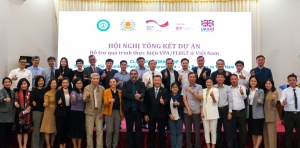Repositioning Vietnam in the timber value chain
How could the ongoing efforts in Vietnam on traceability and due diligence along the timber value chain benefit the sector?
 |
| Anja Barth, chief technical advisor of a forest biodiversity initiative run by the German Development Agency and the Ministry of Agriculture and Rural Development |
We can observe a global shift towards more comprehensively addressing deforestation linked to the production of agricultural commodities. In 2021, many nations signed up to the Declaration on Forests and Land Use, including Vietnam. And surely the recent legislative developments in large consumer countries, most notably the EU Deforestation Regulation, underline this shift.
With this, the EU is expanding its efforts to address deforestation linked to the production of agricultural commodities. This is to minimise the EU’s contribution to deforestation and increase demand for legal and deforestation-free trade. In the future, EU operators will have to conduct due diligence to ensure the legality and deforestation-free production of agricultural and timber products being imported to the EU. This includes the collection of information about supply chains, a thorough risk assessment, and risk mitigation.
The experience and efforts over past years in Vietnam implementing the Voluntary Partnership Agreement on Forest Law Enforcement, Governance, and Trade (VPA/FLEGT) have been very valuable in preparing its private sector operators and the regulatory framework to be ready to provide the required information and assurance.
While there is room for improvement, the traceability of timber along the value chain described in various decrees and by-laws is a good starting point for providing the necessary information for risk assessment and mitigation.
There are surely many lessons learned and good practices from the timber value chain that could help prepare other agricultural commodities for export to the EU.
What is the progress in Vietnam implementing VPA-FLEGT, which the government signed with the EU?
Recognising the global challenges with trade in illegal timber and the growing role of Vietnam’s timber industry, Vietnam and the EU signed the agreement in 2018. It is a legally binding agreement aimed at improving forest governance and promoting the trade of legal timber and timber products exported from Vietnam to the EU and, of course, other markets.
Vietnam has followed up on implementing the VPA/FLEGT commitments in recent years through the Vietnam Timber Legality Assurance System (VNTLAS). There, the key principles for timber import control and FLEGT licencing are outlined.
The implementation of the VPA/FLEGT is regularly reviewed by the joint committees between Vietnam and the EU. Both sides appreciate and recognise the achievements, efforts, and challenges in fulfilling and fully implementing the requirements.
Which aspects of the fulfilment of the agreement should be prioritised?
The strength of the process is the active involvement and commitment of a multitude of stakeholders at all levels. It requires action and accountability from government agencies, timber enterprises, and non-state actors alike. The private sector is already working to improve due diligence in supply chains. They are an essential component of the agreement and the monitoring and evaluation process, along with other non-state actors.
Topics that need to be prioritised in the coming time include enhancing the VNTLAS to fully comply with the VPA/FLEGT. Digitalisation is the key to an effective and efficient VNTLAS and should play a central role. Therefore, enhancing digital capacity for all aspects of the timber value chain, including a database system supporting the VNTLAS, is crucial.
Considering the complexity of international supply chains, priority should be given to enhancing the collaboration with countries of timber harvest to get a better understanding of the specific legality requirements and ensure verification and the implementation of due diligence accordingly in Vietnam.
Finally, it is of the utmost importance for Vietnam to complete the next steps of the implementation of the VPA/FLEGT as quickly as possible. The upcoming new EU legislation on deforestation-free supply chains will have additional aspects and commodities covered. Other markets might follow soon and outline similar, stricter import regulations.
All stakeholders’ continued commitment and practical actions will ensure the sustainable growth of Vietnam’s timber industry while promoting good forest governance.
 | Competition tightens up for Vietnamese timber sector After related US delegations held talks with Vietnam’s Ministry of Industry and Trade on trade issues last week, it has become apparent that Vietnam’s wood and timber industry will need to up its game to hold and eventually increase its market share in the United States. |
 | Vietnam must confirm legit timber supply sources Linking and creating material areas is meant to stabilise the timber supply chain, but it remains difficult to handle shortcomings related to forestry institutions. Dr. To Xuan Phuc, managing director of Forest Trends, talked with VIR’s Hai Van about the sector’s options to develop sustainably. |
 | Strengthening Vietnam's wood industry Vietnam is working to establish a legal supply chain to become a global leader in the processing and export of wood. |
What the stars mean:
★ Poor ★ ★ Promising ★★★ Good ★★★★ Very good ★★★★★ Exceptional
Related Contents
Latest News
More News
- Masan Consumer names new deputy CEO to drive foods and beverages growth (February 23, 2026 | 20:52)
- Myriad risks ahead, but ones Vietnam can confront (February 20, 2026 | 15:02)
- Vietnam making the leap into AI and semiconductors (February 20, 2026 | 09:37)
- Funding must be activated for semiconductor success (February 20, 2026 | 09:20)
- Resilience as new benchmark for smarter infrastructure (February 19, 2026 | 20:35)
- A golden time to shine within ASEAN (February 19, 2026 | 20:22)
- Vietnam’s pivotal year for advancing sustainability (February 19, 2026 | 08:44)
- Strengthening the core role of industry and trade (February 19, 2026 | 08:35)
- Future orientations for healthcare improvements (February 19, 2026 | 08:29)
- Infrastructure orientations suitable for a new chapter (February 19, 2026 | 08:15)

 Tag:
Tag:


















 Mobile Version
Mobile Version